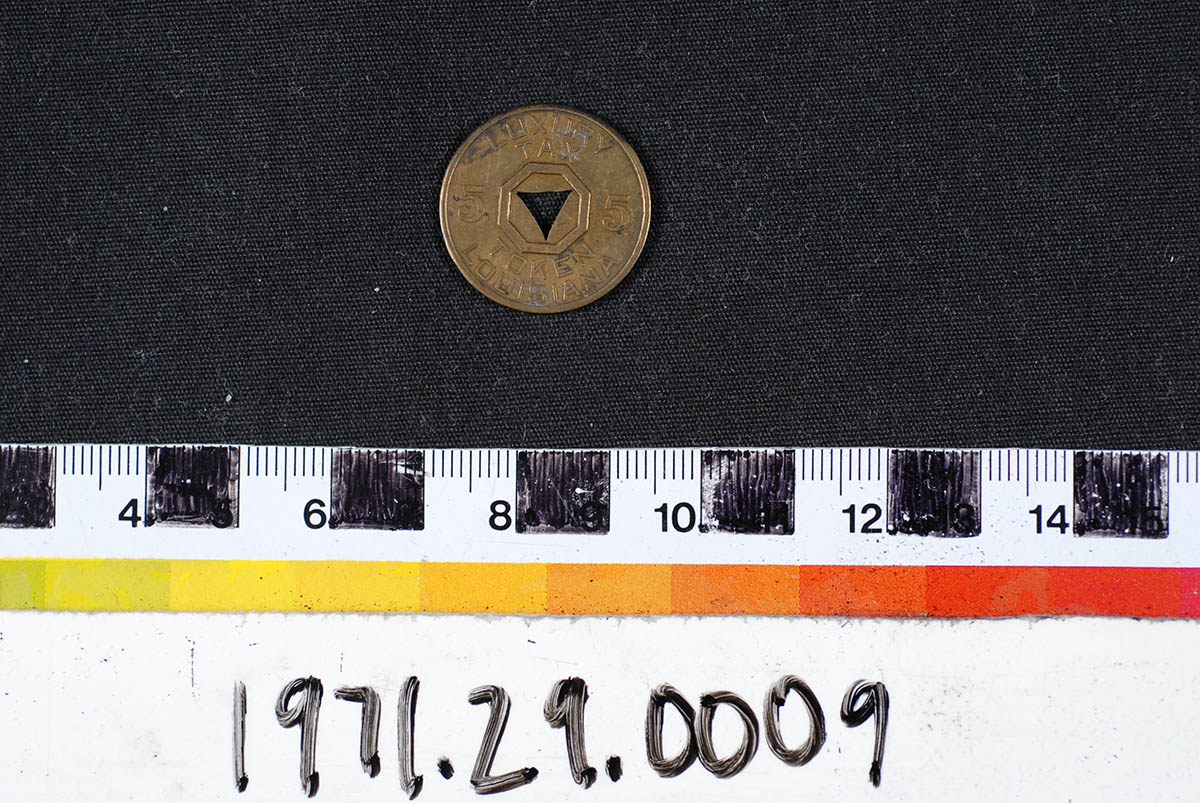The Louisiana luxury tax token was created to enforce the sales tax in this state. The 2% tax on luxuries was replaced by the Public Welfare Revenue Act of 1938. To combat fraud, a variety of exemptions were created. The list included alcoholic beverages, bottle openers, cigars, maple syrup, plum pudding, and much more. The Louisiana Luxury Tax token was the perfect solution. Its unique design allowed customers to pay the exact amount of their purchase.
This type of Tax token was first issued in 1936 in conjunction with the Louisiana Luxury Tax Act, which was a form of a sales tax that was equivalent to 2% on a number of items. This tax was replaced by the Public Welfare Revenue Act of 1938, but was not fully repealed until the early 1960s. The name was given to the new tax because of its many exemptions. The tax exemptions included alcoholic beverages, cigars, bottle openers, and maple syrup.
The Louisiana Luxury Tax token was first issued in 1936. The state issued four million of them, and they were in circulation in New Orleans within ten days. By the end of that year, the tax was abolished. By the end of the year, four million of the Louisiana Luxury Tax tokens were in circulation. Sadly, the state did not fully implement this law. Luckily, the Public Welfare Revenue Act of 1938 ended this practice, and the state has maintained a 5% luxury income tax. The Louisiana Luxury Token is a symbol of the history of this tax.
In 1936, the Louisiana Luxury Tax was issued. It was a 2% tax on a number of goods. The act was repealed in 1938, and the state’s Luxury Tax tokens were withdrawn from circulation. The state government is still collecting the money from consumers, but they are a rare collectible. Nevertheless, the Louisiana Luxury Tender is one of the most interesting and valuable items in the state.
The Louisiana Luxury Tax token is a great way to preserve the history of this state. The state passed legislation in 1936 to impose the tax, and the Public Welfare Revenue Act of 1938 replaced it. This tax was a temporary measure, and only twelve states issued it, including New Orleans. The Public Welfare Revenue Act of 1938 was meant to replace the luxury tax, and the city now charges a 5% tax. The LUXURY TAX TOKEN is available at the City Archives and the New Orleans Public Library.
In addition to the Louisiana Luxury Tax token, other states have also issued them. In 1936, the Louisiana Luxury Tax token was issued to commemorate the first year of the state’s Luxury Tax Act. It was a temporary measure, as the state’s luxury tax was only 2%. However, the city enacted a city luxury-tax to supplement the state’s revenue, and it is still in use today at 5%.
Louisiana Luxury Tax Token: A Unique Piece of Louisiana History
In addition to its historical significance, the Louisiana Luxury Tax token has become an important collector’s item. The state luxury tax token was issued in 1936 in conjunction with the Luxury Tax Act. It was a temporary measure, and only four million were in circulation in the city. Nonetheless, the state’s Luxury-Tax token is still widely available. It is the only official record of the Louisiana luxury-tax. This is a unique piece of Louisiana history. So if you’re looking to add some Louisiana flavor to your collection, be sure to pick up a Louisiana luxury tax token!
The Louisiana Luxury Tax token was issued in conjunction with the Luxury Tax Act of 1936. The tax was equivalent to a 2% levy on certain items. However, the act was later replaced by the Public Welfare Revenue Act of 1938. The reason for the Louisiana Luxury-Tax token’s infamous status is that it was a type of tax that was only applicable to people living in New Orleans. The state’s 2% luxury-tax was also a tax on goods such as alcoholic beverages and bottle openers. In addition to being a form of wealth tax, the state still had exemptions for various other products, including maple syrup and plum pudding. The Louisiana Luxury Tax token was released in 1936 in conjunction with the Luxury Tax Act of 1936. The tax was equivalent to a 2% sales tax on certain items, but the Public Welfare Revenue Act of 1938 eliminated the tax. The state’s “Luxury” Tax was termed as such because it had numerous exemptions. For example, the law exempted alcoholic beverages, cigars, maple syrup, and plum pudding.

For over 20 years, numismatics has been an integral part of my life. I’m an expert in the field, including research, grading, and analysis of data. I have written thousands upon articles about this subject. I continue to author reports and update price guides. I enjoy writing and sharing the passion and excitement of the hobby with veterans and new generations. I am analytical, precise, and highly disciplined. These traits have always helped me achieve outstanding results in my career.
